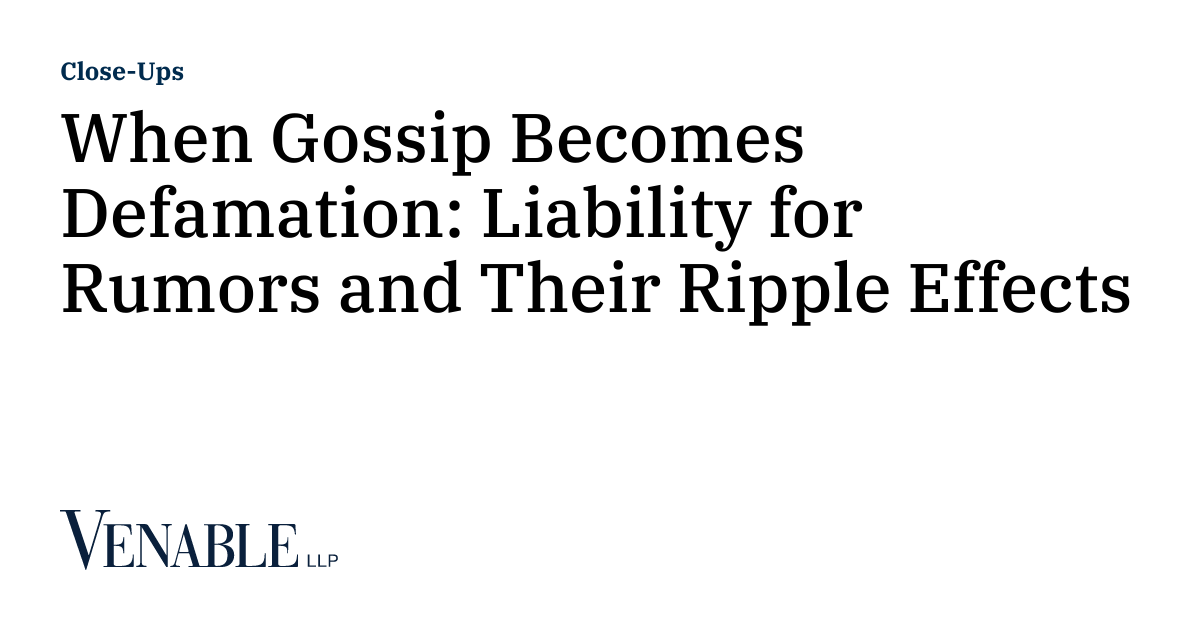In the age of group chats and rumor mills, telling even one person a damaging rumor can unleash consequences far beyond the intent of the original conversation. But when does gossip cross the legal line?
A recent decision out of the Central District of Illinois, Holzgrafe v. Lozier, offers key guidance on this interesting defamation principle.
1. Can You Be Liable for Spreading a Rumor?
Yes.
A statement is potentially defamatory if it tends to harm a person’s reputation to the extent that it lowers that person in the eyes of the community or deters others from associating with that person. Holzgrafe v. Lozier, No. 3:18-cv-03077-SEM-KLM, at 9 (C.D. Ill. May 2, 2025). In Holzgrafe, the defendant and former university tennis player repeated a rumor that the plaintiff, a former university tennis coach, had a sexual relationship with another player. Id. at 11. The court found sufficient evidence that such a statement had a defamatory meaning. Id. at 15, 41.
2. Can You Be Liable for Someone Else Repeating Your Rumor?
Also yes, if that repetition or republication was reasonably foreseeable.
In Holzgrafe, the defendant argued that he shared the rumor only privately with his mom and his girlfriend, thereby making further republications of the rumor unforeseeable. Holzgrafe, No. 3:18-cv-03077-SEM-KLM, at 16-17. The court was not convinced. Id. The court emphasized that context mattered, including that the defendant’s mother had a pattern of reporting alleged misconduct. Id. In short, the court found that it was predictable that the defamatory rumor the defendant shared would, in turn, be shared with others. Id. at 17.
California courts have made similar rulings. For example, in McKinney v. Cty. of Santa Clara, the court held that the defendant was responsible for the republication of defamatory statements because it was reasonably foreseeable that these statements would be repeated. McKinney v. Cty. of Santa Clara, 110 Cal. App. 3d 787, 798 (1980). Just as the defendant in Holzgrafe should have foreseen that sharing a damaging rumor with individuals could reasonably lead to broader dissemination, the McKinney court recognized that the setting and audience of a statement could make republication a foreseeable consequence. Holzgrafe, No. 3:18-cv-03077-SEM-KLM, at 16-17; McKinney, 110 Cal. App. 3d at 798.
3. Can You Defend Yourself by Saying, “That’s Just What I Was Told, So I Just Repeated It?”
No.
This very defense failed in Holzgrafe. No. 3:18-cv-03077-SEM-KLM, at 16-17, 24. The court found the defendant’s argument that he was solely repeating a rumor to be unpersuasive. Id. at 24.
The legal principle here is that foreseeable republication can lead to liability. Id.
4. What Is California’s Take on Spreading Rumors?
California courts have held that people who take a responsible part in the publication of a defamatory statement may be held liable for its republication. Robert D. Sack, Sack on Defamation: Libel, Slander, and Related Problems § 2:10.2 (5th ed. 2019). The rationale is that one who republishes a defamatory statement adopts it as his/her own and is liable in equal measure to the original defamer. Id. at § 2:7.1
The main point is that you do not need to be the original source of the rumor to be held responsible for its impact.
California courts do not allow you to spread rumors without liability. For example, in Khawar v. Globe Int’l, Inc., the California Supreme Court held a newspaper defendant liable for spreading a false rumor about the plaintiff. 19 Cal. 4th 254, 281 (1998).
Conclusion
There are defenses against claims of defamation, of course. But it’s important to note what is not going to help.
** Thank you to summer associate Sam Poursafar for his invaluable assistance.
















Leave a Reply